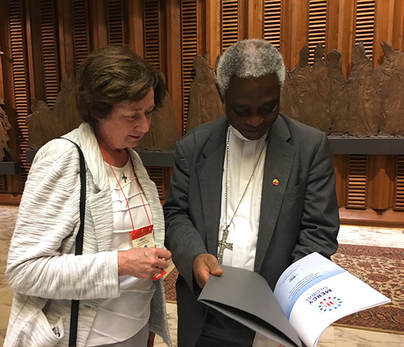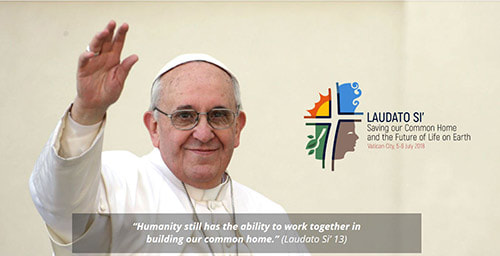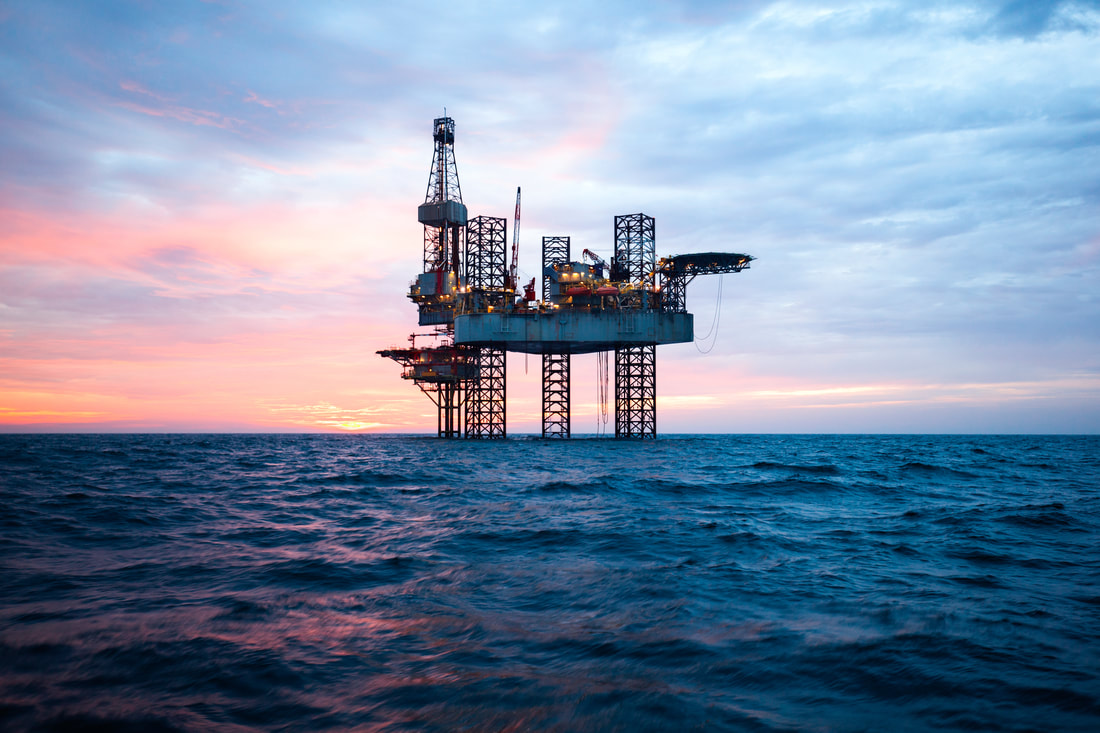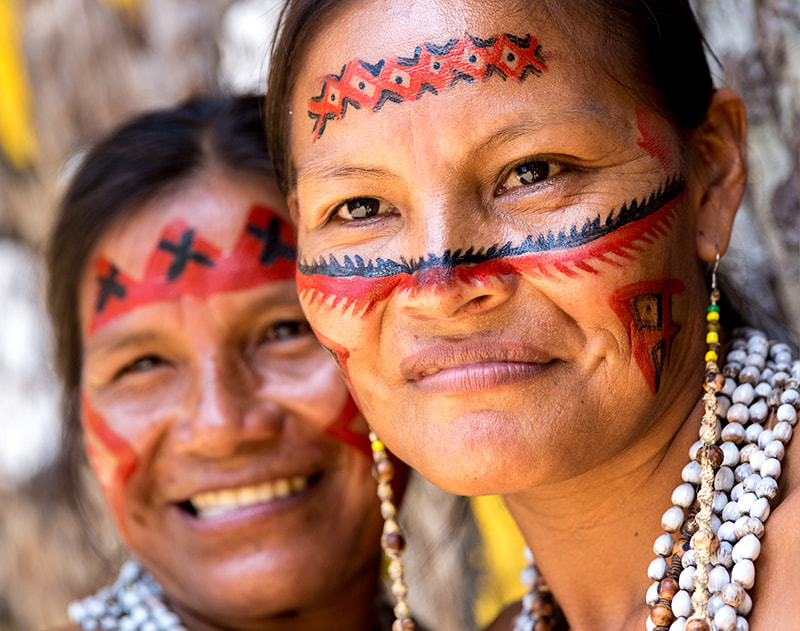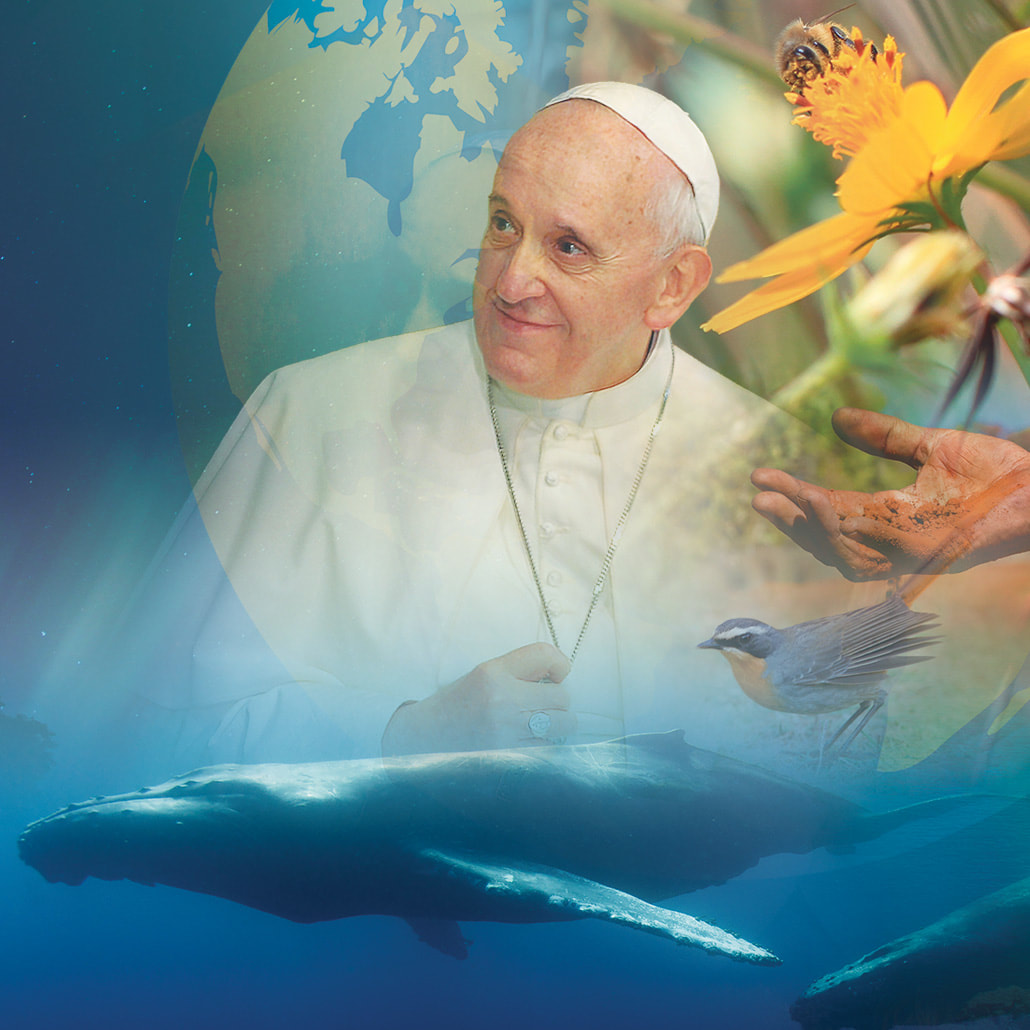Water in Australia - a Critical Concern for Sisters of Mercy
Sisters of Mercy have joined their voices to the call for action by communities and individuals around Australia in regard to the current crisis facing Australia’s struggling river systems.
The Blessing of the Rivers ceremony, a powerful community gathering, took place on 16 February 2019 at the junction of the Murray and Darling Rivers, New South Wales as a prayer service to draw attention to the plight of the rivers. Up to a million fish, including 100-year-old Murray cod, died on 6-7 January in one of the biggest environmental catastrophes to ever hit the river. Three fish kills occurred over December - January.
An illustrated report on the Blessing of the Rivers ceremony can be read here.
COP24 Climate Change Conference: 3-14 December 2018 Critically Important
COP24 to address climate change is now underway in Katowice, Poland. According to Patricia Espinosa, UNFCCC Executive Secretary, COP24 Will be Paris 2.0. "In Poland, as I call it Paris 2.0, we will put together the pieces, directions and guidelines in order to make the framework really operate," she said.
The importance of COP 24 for the world cannot be overstated. In recent weeks we have heard from the IPCC of the need for ‘urgent and unprecedented change’’ and that we have only 12 years to act to reach the 1.5 C target for global warming; from the Vatican that the planet is ‘on the brink of an unprecedented global challenge regarding the sustainability of our common home’ and from the World Wildlife Fund that about 60 percent of mammals, birds, fish and reptiles have been wiped out by human activity since 1970.
“We are clearly the last generation that can change the course of climate change, but we are also the first generation with its consequences,” said Kristalina Georgieva, the CEO of the World Bank.
“Every day, we witness the effects of the changing climate on poor and vulnerable people around the world,” said Adriana Opromolla, at NGO Caritas Internationalis. “Transformation is possible, but political will is needed to make it happen.”
Why is COP24 so important? Watch this video released by the UN just days ahead of the conference commencing.
The importance of COP 24 for the world cannot be overstated. In recent weeks we have heard from the IPCC of the need for ‘urgent and unprecedented change’’ and that we have only 12 years to act to reach the 1.5 C target for global warming; from the Vatican that the planet is ‘on the brink of an unprecedented global challenge regarding the sustainability of our common home’ and from the World Wildlife Fund that about 60 percent of mammals, birds, fish and reptiles have been wiped out by human activity since 1970.
“We are clearly the last generation that can change the course of climate change, but we are also the first generation with its consequences,” said Kristalina Georgieva, the CEO of the World Bank.
“Every day, we witness the effects of the changing climate on poor and vulnerable people around the world,” said Adriana Opromolla, at NGO Caritas Internationalis. “Transformation is possible, but political will is needed to make it happen.”
Why is COP24 so important? Watch this video released by the UN just days ahead of the conference commencing.
Global Centre on Adaptation Established
The Global Commission on Adaptation, launched 16 October, is a new initiative led by Ban Ki-Moon, Bill Gates and Kristalina Georgieva, CEO, World Bank to catalyze a global movement to bring scale and speed to climate adaptation solutions. The Commission includes 17 convening countries and 28 commissioners.
Global leaders have called for urgent acceleration of climate adaptation solutions following a summer of climate-related weather disasters. “Without urgent adaptation action, we risk undermining food, energy and water security for decades to come, " said Ban Ki-moon, 8th Secretary-General of the United Nations.
Watch the video from the Global Center on Adaptation
Global leaders have called for urgent acceleration of climate adaptation solutions following a summer of climate-related weather disasters. “Without urgent adaptation action, we risk undermining food, energy and water security for decades to come, " said Ban Ki-moon, 8th Secretary-General of the United Nations.
Watch the video from the Global Center on Adaptation
Huge Risk if Global Warming Exceeds 1.5C
A landmark report released on Monday, 8 October by the UN Intergovernmental Panel on Climate Change (IPCC) says 'urgent and unprecedented changes are needed' to reach the 1.5 C target for global warming. The target they say 'is affordable and feasible although it lies at the most ambitious end of the Paris agreement pledge to keep temperatures between 1.5C and 2C.'
Among the Headline Statements from the report, we read:
A3. Climate-related risks for natural and human systems are higher for global warming of 1.5°C than at present, but lower than at 2°C (highconfidence).
B4.Limiting global warming to 1.5°C compared to 2ºC is projected to reduce increases in ocean temperature as well as associated increases in ocean acidity and decreases in ocean oxygen levels (high confidence). Consequently, limiting global warming to 1.5°C is projected to reduce risks to marine biodiversity, fisheries, and ecosystems, and their functions and services to humans, as illustrated by recent changes to Arctic sea ice and warm water coral reef ecosystems (high confidence).
B5. Climate-related risks to health, livelihoods, food security, water supply, human security, and economic growth are projected to increase with global warming of 1.5°C and increase further with 2°C.
D7. Strengthening the capacities for climate action of national and sub-national authorities, civil society, the private sector, indigenous peoples and local communities can support the implementation of ambitious actions implied by limiting global warming to 1.5°C (high confidence). International cooperation can provide an enabling environment for this to be achieved in all countries and for all people, in the context of sustainable development. International cooperation is a critical enabler for developing countries and vulnerable regions (high confidence).
An infographic of the highlights of the Report can be accessed here
Among the Headline Statements from the report, we read:
A3. Climate-related risks for natural and human systems are higher for global warming of 1.5°C than at present, but lower than at 2°C (highconfidence).
B4.Limiting global warming to 1.5°C compared to 2ºC is projected to reduce increases in ocean temperature as well as associated increases in ocean acidity and decreases in ocean oxygen levels (high confidence). Consequently, limiting global warming to 1.5°C is projected to reduce risks to marine biodiversity, fisheries, and ecosystems, and their functions and services to humans, as illustrated by recent changes to Arctic sea ice and warm water coral reef ecosystems (high confidence).
B5. Climate-related risks to health, livelihoods, food security, water supply, human security, and economic growth are projected to increase with global warming of 1.5°C and increase further with 2°C.
D7. Strengthening the capacities for climate action of national and sub-national authorities, civil society, the private sector, indigenous peoples and local communities can support the implementation of ambitious actions implied by limiting global warming to 1.5°C (high confidence). International cooperation can provide an enabling environment for this to be achieved in all countries and for all people, in the context of sustainable development. International cooperation is a critical enabler for developing countries and vulnerable regions (high confidence).
An infographic of the highlights of the Report can be accessed here
Earth herself, burdened and laid waste, is among the most abandoned and maltreated of our poor; she “groans in travail” (Rom 8:22). We have forgotten that we ourselves are dust of the earth (cf. Gen 2:7); our very bodies are made up of her elements, we breathe her air and we receive life and refreshment from her waters. (Laudato Si' 2)
Laudato Si’ Conference and the Mercy International Reflection Process
|
Last week (5-6 July 2018), I had the privilege of participating in the Laudato Si’ Conference at Vatican City. It was titled ‘Saving Our Common Home and The Future of Life on Earth’.
The international conference was organised by the Vatican Dicastery for Promoting Integral Human Development, led by Cardinal Peter Turkson, to celebrate the third anniversary of Laudato Si’. The conference was designed ‘to follow the “see-judge-act” trajectory of the encyclical’ and to ‘to engage persons and groups who can develop the Laudato Si’ message’. The purpose for the conference, as stated in the official programme, was to communicate ‘a sense of deep urgency and profound concern for the precarious state of our common planetary home.’ Cardinal Turkson, in his opening remarks, stated clearly that the planet was ‘on the brink of an unprecedented global challenge regarding the sustainability of our common home’ which, due to the effects of climate change, now ‘places a question mark on the very future of human existence and its civilization.’ He went on to say that ‘we are running out of time and that we may be condemning future generations to a common home in ruins.’ The full text of the Report on the International Conference Saving our Common Home and the Future of Life on Earth can be read here |
The facts and presentations put forward at the Conference, by both the scientists and by those who are suffering the most profound effects of climate change, were compelling motivations for me to see significant value in our Mercy networks supporting a second phase of the Mercy International Reflection Process, with a renewed focus on the themes of Laudato Si’. |
International Conference Marks Third Anniversary of Laudato Si'
|
Nearly three years after the publication of Laudato Si’, Pope Francis’ encyclical letter on the care for our common home, the Pontiff’s prophetic words continue to ring in our ears: “What kind of world do we want to leave to those who come after us, to children who are now growing up?” (LS, 160) The International Conference organized by the Vatican Dicastery for Promoting Integral Human Development to celebrate the third anniversary of Laudato Si’, aspired to communicate above all a sense of deep urgency and profound concern for the precarious state of our common planetary home.
The conference, Saving our Common Home and the Future of Life on Earth, held in Rome 5-6 July, was live-streamed and the video archive, documents and presentations can be viewed here Pope Francis addressed the conference participants: 'I thank all of you for coming together to “hear with your hearts” the increasingly desperate cries of the earth and its poor, who look for our help and concern... Your presence here is the sign of your commitment to take concrete steps to save the planet and the life it sustains, inspired by the Encyclical’s assumption that “everything is connected”. That principle lies at the heart of an integral ecology… There is a real danger that we will leave future generations only rubble, deserts and refuse. So I express my hope that concern for the state of our common home will translate into systematic and concerted efforts aimed at an integral ecology.' The full text of the Address to the Participants at the International Conference Saving our Common Home and the Future of Life on Earth can be read here |
I urgently appeal, then, for a new dialogue about how we are shaping the future of our planet. We need a conversation which includes everyone, since the environmental challenge we are undergoing, and its human roots, concern and affect us all. The worldwide ecological movement has already made considerable progress and led to the establishment of numerous organizations committed to raising awareness of these challenges. |
Energy Transition and Care for our Common Home
|
Pope Francis on Saturday, 9 June addressed participants at a Vatican conference dedicated to the need for a transition to clean energy. Read more about the conference here
The energy question has become one of the principal challenges, in theory and in practice, facing the international community. The way we meet this challenge will determine our overall quality of life and the real possibility either of resolving conflicts in different areas of our world or, on account of grave environmental imbalances and lack of access to energy, providing them with new fuel to destroy social stability and human lives. Hence the need to devise a long-term global strategy able to provide energy security and, by laying down precise commitments to meet the problem of climate change, to encourage economic stability, public health, the protection of the environment and integral human development. In my Encyclical Laudato Si’, I appealed to all persons of good will (cf. Nos. 3; 62-64) for the care of our common home, and specifically for an “energy transition” (No. 165) aimed at averting disastrous climate changes that could compromise the well-being and future of the human family and our common home. In this regard, it is important that serious efforts be made to transition to a greater use of energy sources that are highly efficient while producing low levels of pollution. The full text of the Address to Executives of the main Companies in the oil and Natural gas sectors and other energy related businesses can be read here |
This is a challenge of epochal proportions. At the same time, it is an immense opportunity to encourage efforts to ensure fuller access to energy by less developed countries, especially in outlying areas, as well as to diversify energy sources and promote the sustainable development of renewable forms of energy." |
Amazonia: New Paths for the Church and for an Integral Ecology (Preparatory Document)
|
The preparatory document for the Special Assembly of the Synod of Bishops for the Pan-Amazon Region to be held in October 2019 has been released. Read about the synod here.
Preamble
In accordance with the proclamation by Pope Francis on October 15, 2017, the Special Assembly of the Synod of Bishops, called to reflect on the theme: New Paths for the Church and for an Integral Ecology, will take place in October 2019. New paths for evangelization must be designed for and with the People of God who live in this region: inhabitants of communities and rural areas, of cities and large metropolises, people who live on river banks, migrants and displaced persons, and especially for and with indigenous peoples. In the Amazon rainforest, which is of vital importance for the planet, a deep crisis has been triggered by prolonged human intervention, in which a “culture of waste” (LS 16) and an extractivist mentality prevail. The Amazon is a region with rich biodiversity; it is multi-ethnic, multi-cultural, and multi-religious; it is a mirror of all humanity which, in defense of life, requires structural and personal changes by all human beings, by nations, and by the Church. The Special Synod’s reflections transcend the strictly ecclesial-Amazonian sphere, because they focus on the universal Church, as well as on the future of the entire planet. We begin with a specific geographical area in order to build a bridge to the other important biomes of our world: the Congo basin, the Mesoamerican Biological Corridor, the tropical forests of the Asia Pacific region, and the Guarani Aquifer, among others. Listening to indigenous peoples and to all the communities living in the Amazonia – as the first interlocutors of this Synod – is of vital importance for the universal Church. For this we need greater closeness. We want to know the following: How do you imagine your “serene future” and the “good life” of future generations? How can we work together toward the construction of a world which breaks with structures that take life and with colonizing mentalities, in order to build networks of solidarity and inter-culturality? And, above all, what is the Church’s particular mission today in the face of this reality? The full text of the Preparatory Document "Amazonia: New Paths for the Church and for an Integral Ecology" can be read here. |
In recent years, indigenous peoples have begun to write down their own history and to document more formally their own cultures, customs, traditions, and knowledge. They have written about the teachings received from their elders, parents, and grandparents, which are both personal and collective memories. Today, indigenous identity is not only derived from ethnicity. It also refers to the ability to maintain that identity without isolating oneself from the surrounding societies with which one interacts." |
Pope’s Message to Ecumenical Patriarch Bartholomew I for International Symposium on Protecting Planet in Athens
|
... The care of creation, seen as a shared gift and not as a private possession, always entails the recognition and the respect of the rights of every person and every people. The ecological crisis now affecting all of humanity is ultimately rooted in the human heart, that aspires to control and exploit the limited resources of our planet, while ignoring the vulnerable members of the human family. “The violence present in our hearts, wounded by sin, is also reflected in the symptoms of sickness evident in the soil, in the water, in the air and in all forms of life” (Laudato Si’, 2). We cannot ignore the ubiquitous and pervasive evil in today’s situation, “where sin is manifest in all its destructive power in wars, the various forms of violence and abuse, the abandonment of the most vulnerable, and attacks on nature” (Laudato Si’, 66). For this reason, in our Joint Message on the World Day of Prayer for Creation on 1 September last, we stated that “the urgent call and challenge to care for creation are an invitation for all of humanity to work towards sustainable and integral development”....
The full text of the Pope’s message to the Ecumenical Patriarch of Constantinople, Bartholomew I, and to the participants in the International Symposium titled ‘Toward a Greener Attica: Preserving the Planet and Protecting its People,’ ( June 5-8, 2018, Athens) can be read here.
|
The care of creation, seen as a shared gift and not as a private possession, always entails the recognition and the respect of the rights of every person and every people." |

